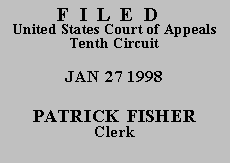

| DONALD GEE,
Plaintiff-Appellant, v. DUANE SHILLINGER, Warden of the Wyoming State Penitentiary; JAMES FERGUSON, Defendants-Appellees.
DONALD GEE, Plaintiff-Appellant, v. WYOMING DEPARTMENT OF CORRECTIONS STATE PENITENTIARY MAXIMUM SECURITY UNIT MANAGER, in his official capacity, aka RONALD G. RUETTGERS, individually, and WYOMING DEPARTMENT OF CORRECTIONS STATE PENITENTIARY SECURITY MANAGER, in his official capacity aka CAPTAIN STAN JAMES, individually, Defendants-Appellees. |
|
In No. 96-8124, he appeals from the district court's order granting summary judgment to defendants. In No. 97-8033, he appeals from the district court's order dismissing his complaint as frivolous under 28 U.S.C. § 1915(d). Both cases involve actions brought under 42 U.S.C. § 1983 in which Gee claims that his right of access to the courts was violated because he was not provided adequate access to a prison law library. In both cases, the district court adopted the magistrate judge's finding that Gee's complaint was frivolous or failed to state a claim because the denial of access he alleged was not related to the preparation of an initial pleading. In No. 96-8124, the district court also adopted the magistrate judge's recommendation that, even if Gee had stated a claim, he failed to show any prejudice resulting from the alleged lack of access to a prison law library, and his claim therefore could not withstand summary judgment.
In habeas and civil rights cases challenging conditions of confinement, this circuit has long interpreted Supreme Court precedent to limit a prisoner's right of access to the courts to legal assistance in the preparation of initial pleadings. See, e.g., Carper v. Deland, 54 F.3d 613, 616-17 (10th Cir. 1995) (citing Bounds v. Smith, 430 U.S. 817 (1977), and Wolff v. McDonnell, 418 U.S. 539 (1974)); Bee v. Utah State Prison, 823 F.2d 397, 398 (10th Cir. 1987) (same); Nordgren v. Milliken, 762 F.2d 851, 854-55 (10th Cir. 1985) (same). The Supreme Court's recent opinion in Lewis v. Casey confirms our interpretation of the law on this point. 116 S. Ct. 2174, 2179-81 (1996). Gee's argument that a prisoner's right of access to the courts is more extensive under Bounds v. Smith than under Lewis v. Casey is meritless. His contention that Lewis v. Casey created a "new" rule that should not be applied to him is frivolous. Thus, under Supreme Court and Tenth Circuit precedent, Gee cannot show, in No. 96-8124, the existence of prejudice as a result of allegedly inadequate access to legal materials because he was not preparing an initial pleading. Contrary to Gee's contention, the district court did not contravene our mandate in the previous appeal in district court No. 90-CV-319-B. See Gee v. Gamble, No. 94-8015, 1994 WL 582119 (10th Cir. Oct. 21, 1994) (holding defendants' qualified immunity defense based on hypertechnical challenge to plaintiff's syntax failed in face of plaintiff's clear intent to allege lack of access to either of two prison law libraries).
Because Gee's argument in both of these appeals is meritless, these two appeals are frivolous under 28 U.S.C. § 1915(e)(2)(B)(i) for purposes of counting "prior occasions" under 28 U.S.C. § 1915(g). In addition, Gee has previously brought one other frivolous appeal before this court. See Cavender v. Uphoff, No. 96-8067, 1997 WL 602418, at **2 n.2 (10th Cir. Sept. 26, 1997). Therefore, from this point forward, Gee will be subject to § 1915(g) filing restrictions. We direct the clerk of this court not to accept any further appeals of judgments in civil actions or proceedings or any extraordinary writs in noncriminal matters, other than habeas, from Gee unless he pays the filing fees established by our rules. See In re Phillips, No. 97-646, 1998 WL 3362, at *1 (10th Cir. Jan. 6, 1998) (holding § 1915 filing fees do not apply to "petitions for writs of mandamus seeking to compel district courts to hear and decide actions brought solely under 28 U.S.C. §§ 2241, 2254 and 2255"). This directive does not apply to appeals or petitions in which Gee claims that he is under imminent danger of serious physical injury. See Schlicher v. Thomas, 111 F.3d 777, 781 (10th Cir. 1997).
We remind appellant that he remains obligated to make monthly payments toward the full filing fee for these appeals when he has or receives any credit to his account.
These appeals are DISMISSED. The mandate shall issue forthwith. Gee's future filings are RESTRICTED as set forth above.
ENTERED FOR THE COURT
Circuit Judge
*. This order and judgment is not binding precedent, except under the doctrines of law of the case, res judicata, and collateral estoppel. The court generally disfavors the citation of orders and judgments; nevertheless, an order and judgment may be cited under the terms and conditions of 10th Cir. R. 36.3.
1. After examining the briefs and appellate record, this panel has determined unanimously to grant the parties' request for a decision on the briefs without oral argument. See Fed. R. App. P. 34(f) and 10th Cir. R. 34.1.9. The case is therefore ordered submitted without oral argument.